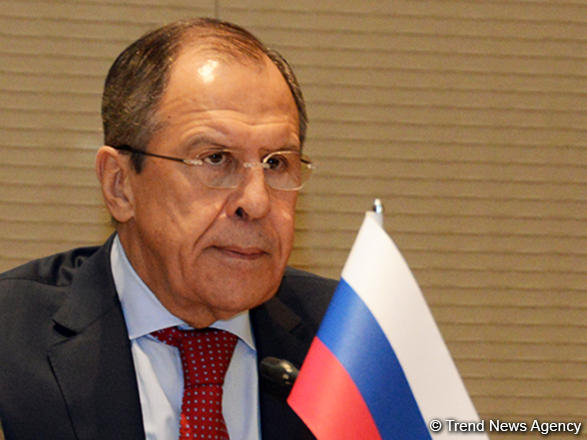Lavrov: U.S. moves escalate already tense situation in world

By Kamila Aliyeva
The global political arena seems to be tense with a number of ongoing crises in relations between world players such as the U.S., Iran and North Korea.
U.S. withdrawal from the Iranian nuclear deal and Washington’s threats to resolve situation in North Korea are escalating the already difficult situation in the world.
This was stated by Russian Foreign Minister Sergey Lavrov at a panel discussion entitled "Global policy and its agenda: How to protect the world" held as part of the World Festival of Youth and Students, TASS reported.
"Continuous loss of mutual trust, which will be hard to restore, also arouses deep concerns. Unfortunately, these negative tendencies were aggravated by the U.S. decision to withdraw from the Joint Comprehensive Plan of Action (JCPOA) on the Iranian nuclear program and by Washington’s threats to solve the Korean Peninsula issues through military action," he noted.
Some governments are trying to pursue solely their own geopolitical goals which harm the joint work, according to Lavrov.
"[They] want to benefit from crises and conflicts. They are applying methods of state structure exports, imposition over other nations of values that are strange to them and ways of reforming without regard to traditions and national aspects more and more often. Use of military force by skirting the UN Security Council, application of unilateral sanctions and exterritorial use of national law seriously undermined the authority of the national law," he added.
As a result we have a dangerous arms race and the risk of uncontrollable spread of mass destruction weapons, Lavrov concluded.
On October 13, U.S. President Donald Trump, long been known as the main critic of the landmark deal, declared his view of the JCPOA, saying that he would not certify Iran’s compliance with the deal. The move paves the way for Congress to put new restrictions on Iran. Moreover, Washington outlined a new hard-line strategy on Iran, according to which the United States will counteract Iran’s ‘destabilizing influence’ and call on the global community to unite efforts to exert pressure over the Islamic Revolutionary Guard Corps (IRGC, an elite branch of Iran’s Armed Forces).
However, it is believed that Trump would not recommend the Congress to re-impose sanctions in order to reach a compromise with many congressional leaders who stand for keeping the deal at least with some changes.
In case sanctions are applied, despite the claims on Iran’s compliance by the International Atomic Energy Agency verifying, the United States would find itself in breach of its commitments. This means a unilateral withdrawal from the agreement, which will damage the reputation of the U.S. in the eyes of world community.
Previously, Iranian President Hassan Rouhani stated that neither Trump nor "ten other Trumps" will be able to nullify the benefits that Tehran receives from the nuclear deal.
The Iran nuclear deal was negotiated in July 2015 between Iran, the five permanent members of the United Nations Security Council and Germany. By ratifying the plan, Iran agreed to scale down its nuclear activities in exchange for sanctions relief.
At the same time, the U.S. retains sanctions against Iran on the missile program, human rights and on suspicion that Tehran sponsors terrorism.
---
Kamila Aliyeva is AzerNews’ staff journalist, follow her on Twitter: @Kami_Aliyeva
Follow us on Twitter @AzerNewsAz
Here we are to serve you with news right now. It does not cost much, but worth your attention.
Choose to support open, independent, quality journalism and subscribe on a monthly basis.
By subscribing to our online newspaper, you can have full digital access to all news, analysis, and much more.
You can also follow AzerNEWS on Twitter @AzerNewsAz or Facebook @AzerNewsNewspaper
Thank you!
